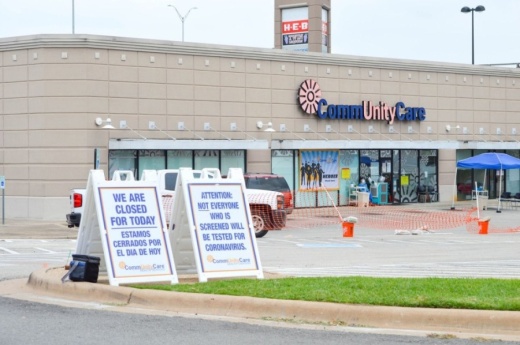According to a July 2 news release, CommUnityCare is longer testing asymptomatic individuals at any of its testing sites. Beginning July 1, CommUnityCare is only testing individuals who show symptoms, those who have a known exposure to the coronavirus or those with other existing health conditions.
“We simply don’t have the means to test everyone,” CommUnityCare Chief Medical Officer Dr. Alan Schalscha said in the news release.
CommUnityCare in early June announced it would begin testing individuals exhibiting no symptoms of COVID-19. The health care provider was able to do so after securing a partnership that provides more than 1,000 tests every week, CommUnityCare said at the time.
However, demand for testing at CommUnityCare sites has at least tripled since that time, said Monica Saavedra, the director of marketing and community relations for CommUnityCare.
“The demand is so great,” Saavedra told Community Impact Newspaper.
At the beginning of June, Saavedra said CommUnityCare was conducting approximately 1,000 tests per week on average. Over the past several weeks, that average has risen to at least 3,000 tests per week.
CommUnityCare has conducted more than 18,000 COVID-19 tests as of July 2, according to the nonprofit’s website. Of those, more than 2,800 tests are still pending results.
This change of course for CommUnityCare follows a similar decision from the city of Austin. On June 26, Austin Mayor Steve Adler said in a Facebook video stream that the city would no longer test asymptomatic people for COVID-19. The mayor further asked anyone with health insurance to seek coronavirus testing from providers other than Austin Public Health.
“Frankly, we don’t have enough testing capability, and the tests are not coming back quickly enough,” Adler said June 26.
Demand was so great at two CommUnityCare sites that the nonprofit announced July 2 it will relocate the clinics. The relocations will allow the health care system to serve the number of individuals that are requesting tests, Saavedra said.
CommUnityCare is relocating its drive-up testing sites at Dove Spring in southeast Austin and Pflugerville. Saavedra said CommUnityCare is currently working to secure larger sites in those same areas.
Pflugerville and southeast Austin have some of the highest positive rates and number of coronavirus cases, according to local data.
As of July 2, the 78744 and 78741 ZIP codes in southeast Austin account for the two highest total number of cases in all of Travis County, according to the city of Austin’s coronavirus dashboard. The 78660 ZIP code, where Pflugerville is located, has the third-highest number of cases.
Similarly, all three ZIP codes have positivity rates for the coronavirus above 20%, according to testing data from CommUnityCare.
Those sites were originally intended to serve 30-40 tests per day, but the demand far outpaced those original projections, Saavedra said. Ultimately, CommUnityCare was providing up to 50 tests per hour at those sites.
“We just don’t have the staff, the time or the resources. It was extremely overwhelming to staff,” Saavedra said.
Central Health, Travis County’s taxpayer-funded health care district, will fund the relocations of these clinics, according to the July 2 news release. Funds will be used to secure tents and refrigerators as well as recruiting and hiring additional staff, according to CommUnityCare.
CommUnityCare additionally stated in its news release that APH will “soon open” a coronavirus testing site for residents in southeast Austin.
All CommUnityCare drive-up locations will be closed for the July 4 weekend, according to the nonprofit. Drive-up locations will close beginning July 3 and will reopen July 6.
“Our testing staff has been working outside, often in extreme heat, in full personal protective equipment since March and they’re exhausted—just like many other frontline health care workers,” Schalscha said in the news release. “We will take the holiday weekend to recharge, re-energize, and plan how we can continue to serve our community.”





